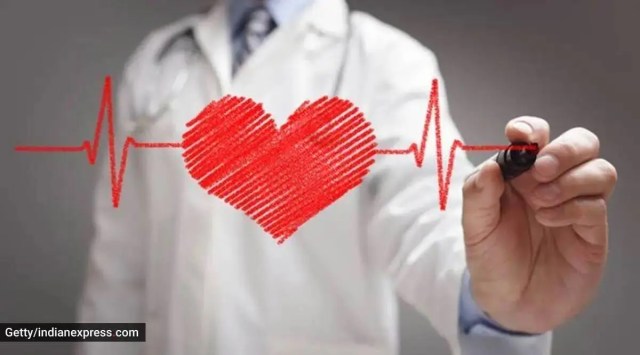- India
- International
Increased heart attack risk linked to salt intake? Understanding how much salt can harm your heart
Salt is a major risk factor for our heart health because when we have more of it, the body retains more water. This increases the blood volume, forcing the heart to perform more, elevating your blood pressure levels, says Dr Balbir Singh, Chairman, Cardiac Sciences, Cardiology, Cardiac, Electrophysiology-Pacemaker, Max Hospital
 Salt is a major risk factor for our heart health because when we have more of it, the body retains more water (Source: Getty Images/Thinkstock)
Salt is a major risk factor for our heart health because when we have more of it, the body retains more water (Source: Getty Images/Thinkstock) Written by Dr Balbir Singh
When we talk about preventive heart health, we must look at the role of salt or sodium, its cascading impact on hypertension and consequently heart attacks and strokes much more seriously than ever before. Just last week, the World Health organisation (WHO) revealed a first-of-its-kind report on global sodium intake reduction, warning how countries worldwide were off-track in achieving the global target of reducing sodium intake by 30 per cent by 2025. Its data showed that an estimated 1.89 million deaths each year are associated with excessive intake of sodium.
Salt is a major risk factor for our heart health because when we have more of it, the body retains more water. This increases the blood volume, forcing the heart to perform more, elevating your blood pressure levels. Over a period of time, the high blood pressure impacts the walls of the blood vessels, overstretching them, and speeding up the formation of sticky plaque that can block blood flow. The sodium in salt tends to affect your blood pressure even more if you’re already sensitive to it.
Now the WHO has recommended a maximum intake of less than 2,000 mg of sodium per day—or less than 5g of salt daily—in adults. However, the report said that the global average sodium intake is estimated to be 4,310 mg per day—around 10.78 g of salt daily—which WHO said “far exceeds the physiological requirement and is more than [the organisation’s] recommendation.” It recommended that “urgent action is required to modify the production and consumption of foods and beverages, including industry manufactured (pre-packaged) food.”
What people need to be aware of is a blood pressure increase of even 3 to 5 mm Hg of systolic, say from 140 mm Hg to 145 mmHg, can increase your risk of heart attack that much more. And salt is a bad trigger for hypertension. There are enough studies to indicate that but I will refer to the 2014 study published in the ‘New England Journal of Medicine,’ which assessed the impact of salt intake by measuring the urinary output of sodium. An estimated sodium intake between 3 g per day and 6 g per day was associated with a lower risk of death and cardiovascular events than was either a higher or lower estimated level of intake. As compared with an estimated potassium excretion that was less than 1.50 g per day, higher potassium excretion was associated with a lower risk of death and cardiovascular events.

High-sodium diets are also usually high in total fat and calories, which may lead to obesity and associated complications. Some studies also suggest that there may be a link between sodium intake and osteoporosis and stomach cancer. But most worryingly, you develop a taste of salt rather quickly. Which means if you consume salty foods over a long period of time, you get accustomed to the taste and reach out for even saltier foods.
So what’s my advisory to patients? Never add salt at the table, keep the salt shaker away. There’s anyway enough salt in preparation of your food. Do not have any kind of processed and preserved food, papad or pickles, the last containing very high salt. Read food labels because certain foods, like a salad dressing, may not taste that salty but have high volume of sodium. While eating out, it is a good idea to skip ordering soup or anything that uses prepared sauce. And do not fall for the sea salt or the Himalayan salt as a healthy option, they all contain sodium and could still affect blood pressure and the heart. About 70 per cent of sodium consumed is from processed and restaurant foods compared to home-cooked foods. The choice is ours to make.
Apr 27: Latest News
- 01
- 02
- 03
- 04
- 05








































